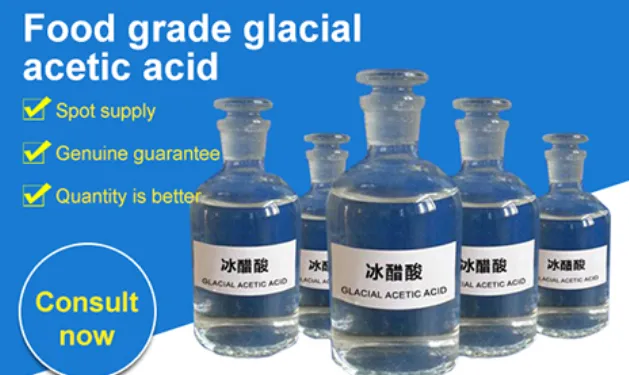
Apr. . 16, 2025 11:55 Zurück zur Liste
Guide to Acetic Acid Glacial: Concentration, Manufacturing, And Applications
Acetic acid glacial is a highly concentrated form of acetic acid, widely used in industrial, pharmaceutical, and chemical applications. Understanding its concentration, manufacturing process, and sourcing from reputable acetic acid glacial manufacturers is crucial for businesses and laboratories that require high-purity chemicals. This guide provides insights into its properties, concentration levels, manufacturers, and common uses.

What Is Acetic Acid Glacial?
Acetic acid glacial refers to acetic acid in its purest form, typically with a concentration of 99% or higher. The term "glacial" comes from its ability to freeze and form ice-like crystals at temperatures below 16.6°C (61.9°F). Due to its strong acidity and versatility, it is widely used across various industries.
Acetic Acid Glacial Concentration and Properties
Chemical Formula: C₂H₄O₂
Concentration: ≥99% purity (glacial form)
Appearance: Clear, colorless liquid with a strong, pungent vinegar-like odor
Boiling Point: 118°C (244°F)
Freezing Point: 16.6°C (61.9°F)
Solubility: Miscible with water, ethanol, and organic solvents
Corrosive Nature: Can cause burns and irritation upon contact
Acetic Acid Glacial Manufacturers and Production
Acetic acid glacial manufacturers produce this chemical through different methods, including:
Methanol Carbonylation (Most Common Method)
Reacting methanol with carbon monoxide in the presence of a catalyst.
Highly efficient and widely used in industrial production.
Acetaldehyde Oxidation
Involves the oxidation of acetaldehyde to produce acetic acid.
Less common but still used in some chemical industries.
Fermentation Process
Biological fermentation of ethanol using Acetobacter bacteria.
Primarily used in food-grade vinegar production rather than industrial-grade acetic acid.
Finding Reliable Acetic Acid Glacial Manufacturers
When sourcing from acetic acid glacial manufacturers, consider the following:
Purity Standards: Ensure the manufacturer meets industrial and pharmaceutical-grade purity requirements (≥99%).
Certifications: Look for ISO, GMP, or other quality control certifications.
Production Capacity: Verify that the supplier can meet bulk order demands.
Global Compliance: Ensure regulatory compliance with international chemical safety and environmental standards.
Logistics and Shipping: Check for secure and efficient shipping options, especially for large-scale industrial buyers.
Common Uses of Acetic Acid Glacial
Due to its high concentration, acetic acid glacial is widely used in various applications, including:
Chemical Manufacturing
Production of acetic anhydride, acetates, and other organic compounds.
Pharmaceutical Industry
Used as a key ingredient in the synthesis of medicines and antiseptics.
Food and Beverage Industry
When diluted, it acts as a food preservative (E260) and flavoring agent.
Textile and Dyeing Industry
Helps in fabric dyeing and textile processing.
Plastic and Rubber Industry
Used in the production of synthetic resins and rubber processing chemicals.
Laboratory Reagent
Used for titrations, pH control, and organic synthesis.
Cleaning and Disinfection
Serves as a descaler and disinfectant when properly diluted.
Safety Precautions When Handling Acetic Acid Glacial
Due to its highly corrosive nature, acetic acid glacial requires careful handling:
Protective Gear: Always wear gloves, goggles, and protective clothing.
Ventilation: Work in a well-ventilated area or fume hood to avoid inhaling fumes.
Proper Storage: Store in tightly sealed, corrosion-resistant containers away from heat and moisture.
Dilution Guidelines: Always add acid to water, not the other way around, to prevent violent reactions.
Acetic acid glacial is a crucial chemical used in a wide range of industries, from pharmaceuticals to textiles and chemical manufacturing. Understanding its concentration, sourcing options, and safety precautions is essential when purchasing from acetic acid glacial manufacturers. By selecting a reputable supplier and following proper handling guidelines, businesses can ensure safe and efficient use of this versatile compound.
Acetic Acid Glacial FAQs
Q1: What is the concentration of acetic acid glacial?
A1: Acetic acid glacial has a concentration of 99% or higher, making it highly pure and corrosive.
Q2: How is acetic acid glacial manufactured?
A2: It is primarily produced through methanol carbonylation, acetaldehyde oxidation, or ethanol fermentation.
Q3: Where can I buy high-purity acetic acid glacial?
A3: You can source it from industrial chemical manufacturers, online marketplaces, and specialty chemical distributors.
Q4: Is acetic acid glacial safe to handle?
A4: It is highly corrosive and must be handled with protective gear and proper ventilation.
Q5: What industries use acetic acid glacial?
A5: It is widely used in pharmaceuticals, food processing, textiles, plastics, and laboratory applications.
-
The Connection and Value of Acetic Acid
NachrichtJul.10,2025
-
The Application of Glacial Acetic Acid in Industrial, Food, Pharmaceutical and Other Fields
NachrichtJul.10,2025
-
Security points of Glacial Acetic Acid Nfpa
NachrichtJul.10,2025
-
Glacial Ethanoic Acid: The 'Versatile' and 'Dangerous Elf' of the Chemical Industry
NachrichtJul.10,2025
-
Formation Principle and Special Properties of Frozen Glassy Acetic Acid
NachrichtJul.10,2025
-
Application of Concentrated Glacial Acetic Acid in Chemical, Pharmaceutical, Food and Other Fields
NachrichtJul.10,2025
